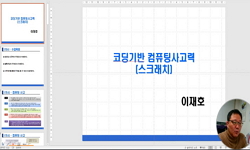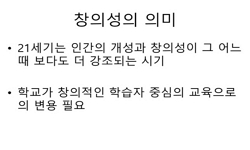본 연구는 동료 프로그래밍(Pair Programming)을 이용한 SW교육이 초등학생의 컴퓨팅 사고력과 창의성 신장에 미치는 효과를 분석하였다. J지역에 소재한 ○○대학교 겨울방학 교육기부 신청 학...
http://chineseinput.net/에서 pinyin(병음)방식으로 중국어를 변환할 수 있습니다.
변환된 중국어를 복사하여 사용하시면 됩니다.
- 中文 을 입력하시려면 zhongwen을 입력하시고 space를누르시면됩니다.
- 北京 을 입력하시려면 beijing을 입력하시고 space를 누르시면 됩니다.
https://www.riss.kr/link?id=A101955713
- 저자
- 발행기관
- 학술지명
- 권호사항
-
발행연도
2016
-
작성언어
Korean
- 주제어
-
KDC
370.714
-
등재정보
KCI등재
-
자료형태
학술저널
- 발행기관 URL
-
수록면
219-234(16쪽)
-
KCI 피인용횟수
27
- 제공처
-
0
상세조회 -
0
다운로드
부가정보
국문 초록 (Abstract)
본 연구는 동료 프로그래밍(Pair Programming)을 이용한 SW교육이 초등학생의 컴퓨팅 사고력과 창의성 신장에 미치는 효과를 분석하였다. J지역에 소재한 ○○대학교 겨울방학 교육기부 신청 학생 3, 4, 5학년 학생을 대상으로 2가지의 연구 가설을 검증하였다. 첫째, 동료 프로그래밍을 이용한 SW교육이 초등학생의 컴퓨팅 사고력 신장에 더 효과적일 것이다. 둘째, 동료 프로그래밍을 이용한 SW교육이 초등학생의 창의성 신장에 더 효과적일 것이다. 검증 결과 동료 프로그래밍을 이용한 SW교육이 초등학생의 컴퓨팅 사고력과 창의성 신장에 유의미한 차이를 보이는 것으로 나타났다.
다국어 초록 (Multilingual Abstract)
In this study, It analyzed the effect that Software education using Pair Programming develope of Elementary Students' Computational Thinking and Creativity. The winter break of ○○ university in J area, education donation application students 3 , 4...
In this study, It analyzed the effect that Software education using Pair Programming develope of Elementary Students' Computational Thinking and Creativity. The winter break of ○○ university in J area, education donation application students 3 , 4 , 5th grader was verified two research hypothesis to the target. First , Software education using Pair Programming will be more effective on the development of elementary school students’ Computational Thinking. Second, Software education using Pair Programming will be more effective on the development of elementary school students’ Creativity. Test results, Software education using Pair Programming is to show a significant difference on the development of elementary school students’ Computational Thinking and Creativity.
목차 (Table of Contents)
- 요약
- ABSTRACT
- 1. 서론
- 2. 이론적 배경
- 2.1 동료 프로그래밍
- 요약
- ABSTRACT
- 1. 서론
- 2. 이론적 배경
- 2.1 동료 프로그래밍
- 2.2 SW교육
- 2.3 컴퓨팅 사고력
- 2.4 창의성
- 2.5 엔트리
- 2.6 선행연구 분석
- 3. 교육 교재 개발
- 3.1 개발 방향
- 3.2 프로그램 개발 방향
- 3.3 교육 프로그램 내용 설계
- 3.4 교재 내용 및 방법
- 4. 연구방법 및 절차
- 4.1 연구대상
- 4.2 동료 구성
- 4.3 검사도구
- 4.4 연구절차
- 5. 연구결과
- 5.1 계산적 인지력 검사
- 5.2 창의성 검사
- 5.3 연구 결과 분석
- 6. 결론
- 참고문헌
참고문헌 (Reference)
1 김미량, "컴퓨터 프로그래밍 교육에 적용 가능한 효과적 교수방법의 탐색적 대안" 한국컴퓨터교육학회 5 (5): 1-10, 2002
2 성정숙, "국외 컴퓨터 교육과정의 변화 분석" 한국컴퓨터교육학회 18 (18): 45-54, 2015
3 김병수, "계산적 사고력 신장을 위한 PPS기반 프로그래밍 교육 프로그램" 제주대학교 대학원 2014
4 "Wikipedia"
5 Devlin, K, "Why universities require computer science students to take math" 46 (46): 37-39, 2013
6 Rogers, C., "Toward a theory of creativity" Ins. Parnes & H 1962
7 Torrance, E. P., "Torrance Tests of Creative Thinking Directions manual and scoring guide(Figual test booklet A)"
8 Guilford, J. P., "Three faces of intellect" 14 : 469-479, 1959
9 Treffinger, D. J., "Theoretical perspectives on creative learning and its facilitation: An overview" 17 : 9-17, 1983
10 Ko Il Jae, "The effect of pair programming on student achievement and Interest in programming class" Chung-ang University of Education 2006
1 김미량, "컴퓨터 프로그래밍 교육에 적용 가능한 효과적 교수방법의 탐색적 대안" 한국컴퓨터교육학회 5 (5): 1-10, 2002
2 성정숙, "국외 컴퓨터 교육과정의 변화 분석" 한국컴퓨터교육학회 18 (18): 45-54, 2015
3 김병수, "계산적 사고력 신장을 위한 PPS기반 프로그래밍 교육 프로그램" 제주대학교 대학원 2014
4 "Wikipedia"
5 Devlin, K, "Why universities require computer science students to take math" 46 (46): 37-39, 2013
6 Rogers, C., "Toward a theory of creativity" Ins. Parnes & H 1962
7 Torrance, E. P., "Torrance Tests of Creative Thinking Directions manual and scoring guide(Figual test booklet A)"
8 Guilford, J. P., "Three faces of intellect" 14 : 469-479, 1959
9 Treffinger, D. J., "Theoretical perspectives on creative learning and its facilitation: An overview" 17 : 9-17, 1983
10 Ko Il Jae, "The effect of pair programming on student achievement and Interest in programming class" Chung-ang University of Education 2006
11 Maslow, A. H., "The creative attitude" 3 : 4-10, 1963
12 Mednick, S., "The associative basis of the creative process" 69 (69): 220-232, 1962
13 Nam Seung Hyun, "Software Education in Science Experiments Based on The Mini-Computer" 19 (19): 51-55, 2015
14 Hazzan, O., "Reducing abstraction level when learning abstract algebra concepts" 40 (40): 71-90, 1999
15 한건우, "Pair Programming이 학업성취도와 학습동기전략에 미치는 영향" 한국컴퓨터교육학회 9 (9): 19-28, 2006
16 Williams, L., "Pair Programming in an Introductory computer Science Course: Initial Results and Recommendations" 20-27, 2002
17 Ministry of Education, "Operating instructions for Software Education"
18 Kim Kyung Hee, "Is creativity unidimensional or multidimensional? Analyses of the torrance tests of creative thinking" 18 (18): 251-260, 2006
19 Kramer, J., "Is abstraction the key to computing?" 50 (50): 36-42, 2007
20 Hong Sun Jeong, "Intelligence and creativity : Psychological inquiry For Human intelligence" Yangseowon 2006
21 Ministry of Education, Ministry of Science, ICT and Future Planning, "Human Resource Development Plan for the SW-oriented society"
22 Park Hyo Min, "Global software educational status and tools trends" Korea Internet & Security Agency 2014
23 Torrance, E. P., "Giftedness in solving furture problems" 12 (12): 75-86, 1978
24 Jeon So Eun, "Evaluating the Effectiveness of Pair Programming" Konkuk University 2009
25 "Entry Website"
26 Kim Jin Kyoung, "Effects that Application of Pair Programming and Reflective Journal have on Self-regulated Learning and Programming Ability" Incheon National University of Education 2010
27 Song Yoon Jeong, "Effects on improving academic achievement pair programming in programming practice curriculum" Korea University of Education 2005
28 Sternberg, R. J., "Creating creative minds" 72 : 608-614, 1991
29 Wing, J. M., "Computational thinking and thinking about computing" 366 : 3717-3725, 2008
30 Wing, J. M., "Computational thinking" 49 (49): 33-35, 2006
31 Kim Kyung Hee, "Can we trust creativity tests? A Review of the Torrance Tests of creative thinking(TTCT)" 18 (18): 3-14, 2006
32 CSTA, "CSTA K-12 Computer Science Standards (Doctoral dissertation, Bowdoin College)"
33 Park Byeong Gi, "Based on creativity -education" Science of education 1998
동일학술지(권/호) 다른 논문
-
피지컬 컴퓨팅 교육을 통해 교사가 지각한 기회 및 도전요소
- 한국정보교육학회
- 최형신
- 2016
- KCI등재
-
- 한국정보교육학회
- 강성웅
- 2016
- KCI등재
-
Computational Thinking 역량 평가를 위한 서술형 수행평가 도구
- 한국정보교육학회
- 전수진
- 2016
- KCI등재
-
중학교 과학수업에 적용된 플립러닝(Flipped Learning)의 효과
- 한국정보교육학회
- 이정민
- 2016
- KCI등재
분석정보
인용정보 인용지수 설명보기
학술지 이력
| 연월일 | 이력구분 | 이력상세 | 등재구분 |
|---|---|---|---|
| 2022 | 평가예정 | 재인증평가 신청대상 (재인증) | |
| 2019-01-01 | 평가 | 등재학술지 유지 (계속평가) |  |
| 2016-01-01 | 평가 | 등재학술지 유지 (계속평가) |  |
| 2012-01-01 | 평가 | 등재학술지 유지 (등재유지) |  |
| 2009-01-01 | 평가 | 등재학술지 선정 (등재후보2차) |  |
| 2008-01-01 | 평가 | 등재후보 1차 PASS (등재후보1차) |  |
| 2007-01-01 | 평가 | 등재후보학술지 유지 (등재후보1차) |  |
| 2006-01-01 | 평가 | 등재후보 1차 FAIL (등재후보1차) |  |
| 2005-01-01 | 평가 | 등재후보학술지 유지 (등재후보1차) |  |
| 2004-01-01 | 평가 | 등재후보학술지 유지 (등재후보1차) |  |
| 2002-01-01 | 평가 | 등재후보학술지 선정 (신규평가) |  |
학술지 인용정보
| 기준연도 | WOS-KCI 통합IF(2년) | KCIF(2년) | KCIF(3년) |
|---|---|---|---|
| 2016 | 1.5 | 1.5 | 1.45 |
| KCIF(4년) | KCIF(5년) | 중심성지수(3년) | 즉시성지수 |
| 1.41 | 1.25 | 1.991 | 0.38 |





 ScienceON
ScienceON eArticle
eArticle






